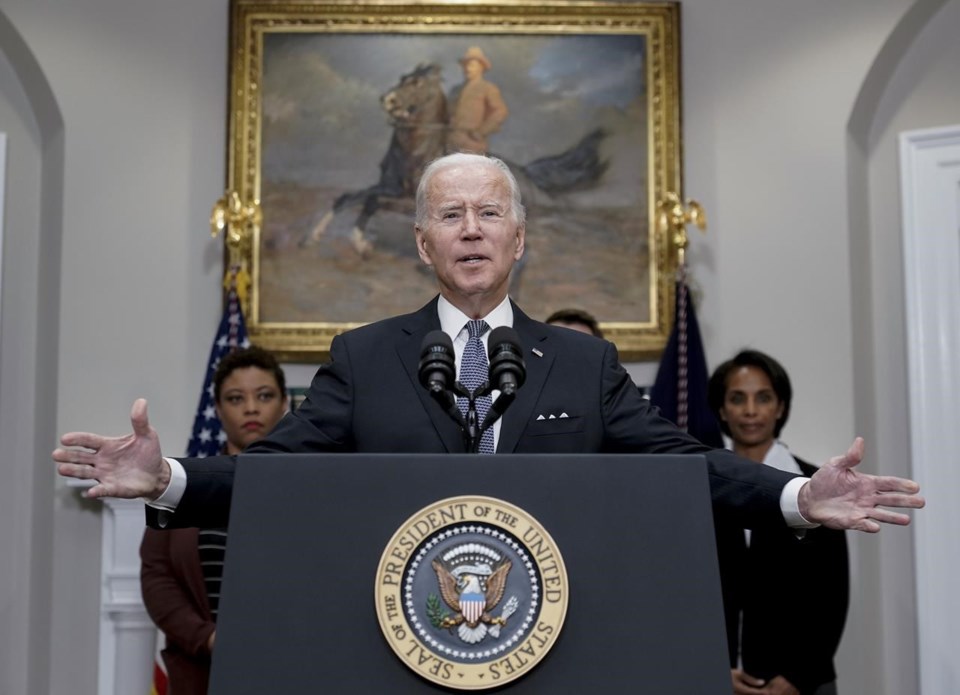This fiscal year’s budget deficit shrunk in half from last year, but the red ink soared on a monthly basis in September largely because of President Joe Biden's plans to forgive student debt, as three decades' worth of costs were compressed into a single month.
The budget figures released Friday by the Treasury Department reveal dueling visions about what it means to be financially responsible: Biden can rightly claim that the budget deficit for fiscal 2022 plunged $1.4 trillion from the prior year; critics can use the same report to say that forgiving education loans pushed up the federal debt by roughly $400 billion as the government booked the full expense.
Buried in the numbers is a deeper battle between Democrats and Republicans about what it means to be good financial stewards. The federal budget deficit totaled $1.38 trillion this year. That’s down from $2.78 trillion in fiscal 2021 —and it's a message that Biden wants to sell to voters going into the midterm elections.
“Today we have further proof that we're rebuilding the economy in a responsible way,” Biden said in remarks at the White House. “Republicans in Congress are doubling down on a commitment to explode the deficit again.”
The annual deficit roughly halved in size because of the end of spending tied to coronavirus pandemic relief and higher tax revenues as more Americans found jobs — an improvement that Biden credits to his policies.
Republicans counter that Biden's $1.9 trillion coronavirus relief plan that helped fuel those job gains also helped to trigger high inflation, a key concern of voters going into the midterms. They also want to reverse his recent 15% minimum tax on corporations and expanded funding for the IRS, even though both could reduce forecasted deficits.
The government will likely need to raise its legal capacity to borrow and House Republican leader Kevin McCarthy has signaled that he would push for spending cuts if the GOP gains a majority in the Nov. 8 vote.
“You can’t just continue down the path to keep spending and adding to the debt," McCarthy said in an interview this week with Punchbowl News. “There comes a point in time where, okay, we’ll provide you more money, but you got to change your current behavior. We’re not just going to keep lifting your credit card limit, right?”
Biden interpreted those comments as a threat to hold U.S. government funding hostage and possibly make it impossible for the government to repay its debt.
“They will crash the economy next year by threatening the full faith and credit of the United States, for the first time in our history putting the United States in default unless unless we yield to their demand to cut Social Security, Medicare,” Biden said.
Noting that momentum in recent months has swung between the two parties, Biden said he expects voter energy will shift back to Democrats because gasoline prices have fallen in the past two weeks and the unemployment rate has stayed low.
He also went on the offensive with his economic message, saying Republican plans to undo his policies and preserve expiring tax cuts that favor the wealthy would ultimately push up budget deficits.
“Put it all together and the Republican plan would add about $3 trillion to the deficit -- $3 trillion,” the president said. “Adding another $3 trillion to the deficit is reckless, it’s irresponsible, and it would make inflation worse.”
Administration officials have argued that the forgiveness of student debt will allow borrowers to achieve life milestones such as buying a home and starting a family. Republican lawmakers counter that the forgiveness is a giveaway that disadvantages blue collar workers and those who did not attend college.
The monthly report added to those tensions, as much of the cost of debt forgiveness was booked in September, even though the repayment of the loans would have likely occurred over 30 years.
Biden in August announced $10,000 in federal student debt cancellation for those with incomes below $125,000 a year, or households that make less than $250,000 a year. Those who received federal Pell Grants to attend college are eligible for an additional $10,000 in forgiveness.
Biden's plan makes 20 million people eligible to get their federal student debt erased entirely.
States and groups affiliated with Republicans have filed lawsuits to try to block the forgiveness. A federal judge on Thursday dismissed a suit from six GOP-led states, saying the states lacked legal standing, a decision that the states intend to appeal.
Federal finances improved over the past 12 months as the unemployment rate dropped to 3.5% from 4.7% in September 2021. The job gains enabled tax revenues to jump 21% from a year ago, while overall spending fell 8% as the government's coronavirus-related aid has faded.
In May, the Congressional Budget Office expected the federal deficit to fall in 2023 and then start to rise in the years ahead to $2.25 trillion a decade from now.
Josh Boak, The Associated Press



